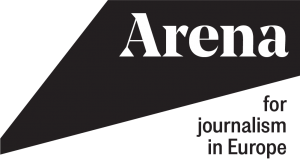The New Sector
Mapping & Matching Independent Public-Interest Media Across Europe
Welcome!
A new generation of venturous news organisations is rising all over Europe. One that is strongly committed to serve its audience and democracy through public interest journalism. With legacy media still reeling from the crisis of their business model it’s these journalistic entrepreneurs who are not simply trying to fix a broken system but to create a new one instead. Join us in our effort to outline and connect Europe’s emerging innovative media scene in a joined project between partners from journalism and academia. Be part of what we call: The New Sector.
Mapping: We want to provide an overview on who is there, doing what.
Data: We will gather information on editorial issues, the business side and more.
Network: Parallel to the mapping we are setting up a European network of independent news orgs.
Research: We work together with academia to spark research on the evolving scene of independent news orgs.
The Map (beta)
We collected information from more than 50 European news outlets (more to come) that belong to what we consider The New Sector. From the results of our initial survey we can see a broad variety of stakeholders in the field - from tiny start-ups run by volunteers to established newsrooms with a paid staff of more than 20 people. The size of the circles in the map indicate the number of staff. Also, a good number of these outlets has gained charitable status in the past - as is displayed here.
Discover The New Sector by clicking on the dots (clicking makes the info stick)!
Here is a working definition of what we mean by independent and public interest news outlets. This definition may be adapted and refined through the mapping process. For now, we include newsrooms that…
This working definition was inspired by the research of Magda Konieczna, the Membership Standards of the Institute for Nonprofit News and the Guidelines of the Forum Gemeinnütziger Journalismus in Germany.
2017
GIJC in Johannesburg: The initial idea for networking between European news non-profits dates back to the Global Investigative Journalism Conference in South Africa.
|
2018
Dataharvest: At the conference a round table discussed whether and how emerging news non-profits in Europe can network on entrepreneurial challenges.
|
2019
Grow Fellowship: The impulse from Johannesburg was taken up prior to the GIJC in Hamburg. Netzwerk Recherche invited pioneers from Europe‘s non-profit journalism sphere for a special pre-conference. The idea of a network to enable and support collaboration and the exchange of expertise was well received among the group.
Informal Meeting: An informal discussion connected with a meeting called by Civitates, bringing together foundations and journalism organisations, highlightes the need for media organisations to collaborate and to get support about management skills.
|
2020
Teaming Up: To bring the idea to live Netzwerk Recherche partnered with Arena for Journalism in Europe and launched the mapping project at Dataharvest conference 2020. It was agreed to broaden the focus from non-profits only to all independent media organizations with a “non-profit state of mind”. Also, academic partners from ZEMKI and HBI joined the mapping effort.
Getting Started: As a first step on the way of creating a network of independent newsrooms a mailing list was launched in which 40 like-minded newsrooms share their thoughts on the project.
|
2021
First Steps: In a survey among members of our mailing list we found out how the organizations envision this network.
|
To Be Continued...
Publishing a Map
Launching a Network
Netzwerk Recherche is the German association for investigative and data journalists. With support of the Schöpflin foundation Netzwerk Recherche is heavily engaged in supporting the evolving sector of non-profit journalism in Germany and Europe, providing grants and fellowships in it's Grow programme for non-profit media entrepreneurs.
Arena for Journalism in Europe supports collaborative journalism – journalists working with other journalists across geographical borders, and journalists working across professional borders with scholars or scientists as well as with civil society. Arena hosts the annual Dataharvest conference and develops open collaborative networks like the Housing Project and the Climate Network
The Leibniz Institute for Media Research | Hans Bredow Institute (HBI) in Hamburg is one of the leading media research institutes in Europe. The institute's research perspective focuses on media transformation and related structural changes of public communication. With its cross-medial, interdisciplinary and independent research, the institute combines basic research and transfer research, and thus, generates knowledge on issues relevant for politics, commerce and civil society.
The Centre for Media, Communication and Information Research (ZeMKI) is one of nine Central Research Units of the University of Bremen and and is among the leading European institutions for researching questions of media-related transformations at the interface of cultural and social sciences on the one hand and technical sciences on the other. A special focus of the research is the emerging digital society with regard to existing inequalities, both in terms of current challenges posed by algorithms, automation and data as well as historical questions of their genesis.
Schöpflin Stiftung believes that a free press is a prerequisite for an open society and a vibrant democracy. As one way of overcoming the crisis in legacy media, the foundation turned its focus to non-profit journalism as a necessary addition to state-funded and commercial journalism.
The DFG funded project "Pioneer Journalism" investigates new and experimental forms of journalism as a principal force in the re-figuration of journalism and its organizational foundations. Pioneer journalism encompasses such forms of journalism that are dedicated to re-defining the field. This includes journalism from established media organizations and startups alike, journalism supported by accelerators, or journalism pursued by individual pioneers.




